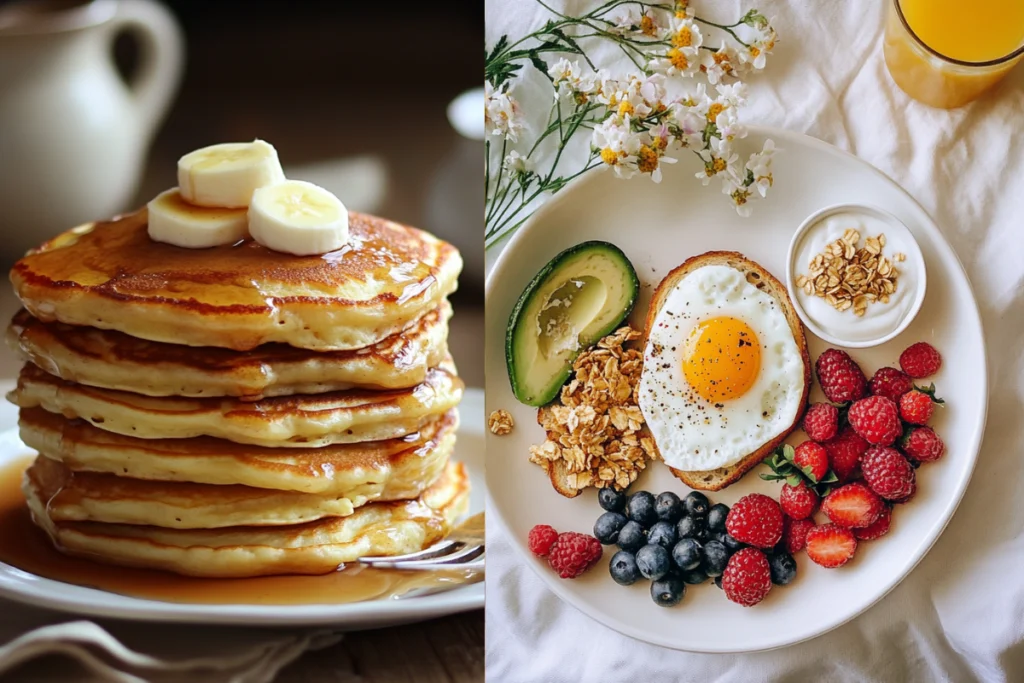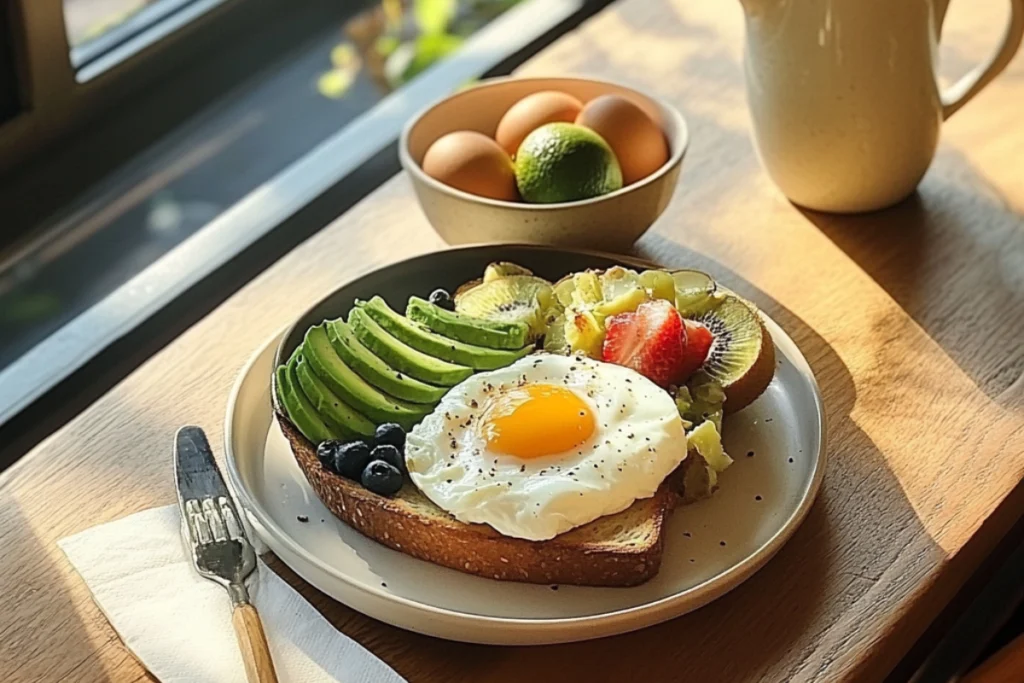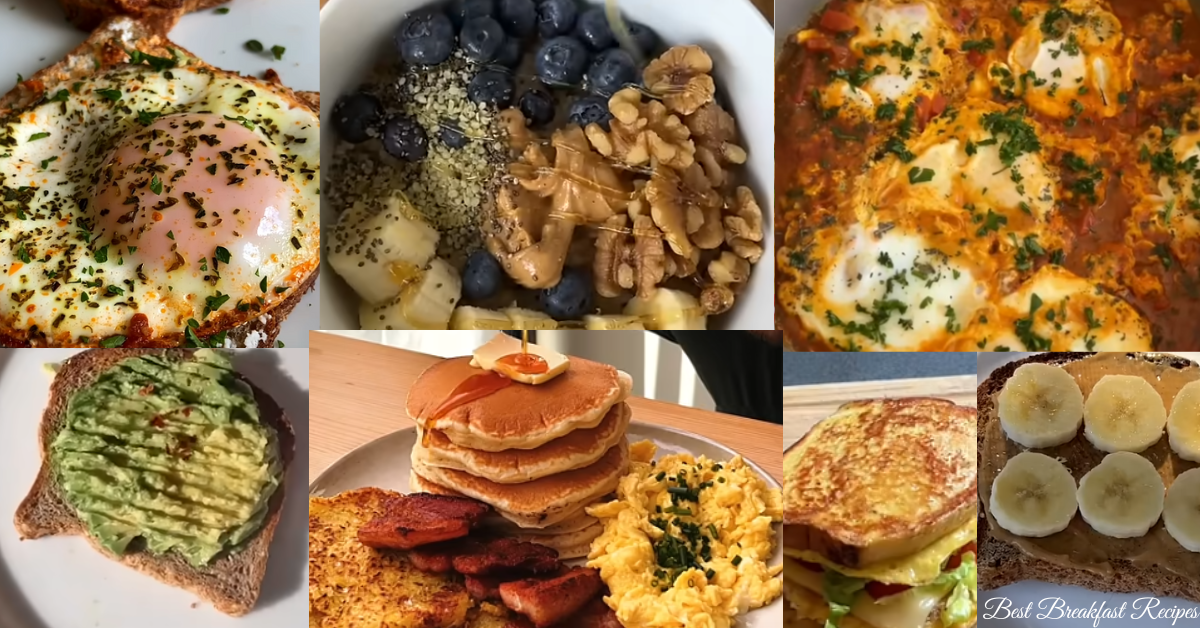Breakfast is often regarded as the most important meal of the day, and for good reason. Not only does it fuel your body after a night of fasting, but it also provides essential nutrients and sets the tone for a productive day ahead. But what truly makes for the best breakfast recipes? In this comprehensive guide, we’ll explore why breakfast matters, discuss its nutritional components, highlight global inspirations, examine modern trends, and provide practical tips to enhance your mornings.
Why Breakfast Matters
Starting your day with a healthy breakfast offers numerous benefits for both your body and mind. On the other hand, skipping breakfast can leave you feeling sluggish and lead to overeating later in the day. A well-balanced meal:
- Boosts metabolism: Eating in the morning activates your body’s calorie-burning processes.
- Improves focus and mood: Breakfast replenishes glucose, enhancing concentration and mental clarity.
- Provides sustained energy: A nutritious breakfast stabilizes blood sugar levels, keeping you energized until lunchtime.
Moreover, research shows that regularly consuming breakfast can reduce the risks of chronic diseases, such as type 2 diabetes and heart disease. Therefore, making breakfast a daily habit is crucial for long-term health.
What Makes the Best Breakfast?
The secret to the best breakfast lies in balance. A meal that combines protein, complex carbohydrates, healthy fats, and fiber ensures you stay full and energized throughout the morning. For example, a well-balanced breakfast should include:
- Protein: Keeps you satiated and supports muscle repair. Eggs, Greek yogurt, or tofu are excellent choices.
- Whole grains: Oats, quinoa, and whole-grain bread provide slow-releasing energy.
- Healthy fats: Avocado, nuts, and seeds add richness and help maintain brain function.
- Fruits and vegetables: These are packed with vitamins, minerals, and antioxidants, rounding out your meal with essential nutrients.
Additionally, if you’re looking for a vibrant and nutritious twist, explore purple sweet potato recipes, which offer both taste and visual appeal.
Breakfast and Energy Levels
Breakfast plays a critical role in stabilizing energy levels. After fasting overnight, your body relies on a morning meal to replenish glycogen stores and prevent energy slumps. Without breakfast, you may feel fatigued, irritable, or distracted by mid-morning.
To ensure sustained energy throughout the day, your breakfast should include:
- Protein: Provides a steady energy source.
- Whole grains: Offer slow-releasing carbs that fuel your body for hours.
- Healthy fats: Add satiety and improve endurance.
For instance, oatmeal topped with almond butter, banana slices, and chia seeds is a perfect combination. Not only does it taste delicious, but it also keeps your blood sugar stable and energy levels high.

Global Inspirations for Breakfast
Across the world, breakfast reflects cultural traditions and local ingredients. Exploring these global flavors can bring variety and excitement to your mornings:
American Breakfasts
- Classics: Pancakes, scrambled eggs, bacon, and toast are iconic staples.
- Modern options: Avocado toast with poached eggs or smoked salmon caters to health-conscious individuals.
European Breakfasts
- Continental style: Croissants, jam, fresh fruit, and coffee provide a light yet satisfying start.
- English breakfast: A hearty combination of eggs, sausage, baked beans, mushrooms, and toast.
Asian Breakfasts
- Japanese breakfast: Miso soup, steamed rice, grilled fish, and pickled vegetables create a balanced meal.
- Indian breakfast: Dishes like dosa, idli, and paratha are paired with chutneys and sambhar, offering rich flavors and nutrition.
Therefore, by incorporating global breakfast ideas, you can add excitement to your routine.
Modern Breakfast Trends
In recent years, breakfast has evolved to meet the needs of busy, health-conscious individuals. Popular trends include:
- Smoothie bowls: Filled with fruits, granola, and seeds, these are both visually appealing and nutrient-dense.
- Overnight oats: Convenient and customizable, they’re ideal for busy mornings.
- Chia pudding: A light yet filling option, rich in fiber and omega-3s.
- Vegan alternatives: Tofu scrambles and plant-based breakfast bowls are increasingly popular.
For more creative ideas, consider trying Blackstone breakfast recipes to elevate your meals.
Building Your Perfect Breakfast
Creating a nutritious breakfast doesn’t have to be complicated. Instead, focus on these principles:
- Plan ahead: Prep ingredients like oats, fruits, or boiled eggs the night before.
- Combine flavors: Mix sweet and savory elements, such as fruit with nut butter or eggs with whole-grain toast.
- Stay hydrated: Pair your meal with water, tea, or black coffee for hydration and alertness.
- Experiment with variety Rotate between different protein sources, grains, and toppings to keep things exciting.
By following these steps, you can ensure your breakfast is both nutritious and enjoyable.

Common Breakfast Mistakes to Avoid
Although breakfast is essential, it’s easy to make mistakes that undermine its benefits. To maximize the advantages of this meal, avoid:
- Skipping breakfast entirely: This often leads to fatigue and overeating later in the day.
- Overloading on sugar: Sugary cereals and pastries can cause energy crashes.
- Ignoring protein: A lack of protein may leave you feeling hungry soon after eating.
- Rushing through meals: Eating too quickly can lead to poor digestion and overeating.
Instead, take the time to enjoy a balanced breakfast that sets you up for success.
FAQs About Breakfast
1. What is the healthiest breakfast option?
A meal with protein, healthy fats, and whole grains—such as oatmeal with almond butter and fruit—is an excellent choice.
2. Is skipping breakfast unhealthy?
Yes, skipping breakfast can reduce energy levels, impair focus, and increase the risk of overeating later in the day.
3. What are some quick, low-calorie breakfast ideas?
Greek yogurt with berries, avocado toast on whole-grain bread, or boiled eggs with vegetables are great options.
4. How can I make breakfast appealing for kids?
Use colorful ingredients like mini pancakes, fruit skewers, or breakfast muffins to make meals fun and engaging.
5. Are breakfast smoothies healthy?
Absolutely! A smoothie with fruits, greens, and protein is both convenient and nutritious.
Breakfast for Specific Lifestyles
Your breakfast should adapt to your lifestyle. For example:
- On-the-go professionals: Smoothies, granola bars, or pre-made overnight oats.
- Families: Large batches of pancakes or breakfast casseroles that can serve everyone.
- Athletes: Protein-packed meals like egg whites with avocado and whole-grain toast.
- Vegetarians or vegans: Tofu scrambles or chia pudding with plant-based milk.
Customizing your breakfast ensures it aligns with your schedule and dietary goals.
Tips for a Better Breakfast Routine
Finally, here are some actionable tips to improve your breakfast routine:
- Start small: If you’re not used to eating breakfast, begin with light options like fruit or a smoothie.
- Make it social: Share breakfast with family or friends to make it a meaningful experience.
- Experiment with new recipes: Trying new flavors and techniques keeps breakfast exciting.
- Avoid processed foods: Focus on whole, minimally processed ingredients for better nutrition.
Conclusion
Breakfast is more than just a meal—it’s a chance to fuel your body, explore new flavors, and set the tone for a successful day. Whether you prefer traditional dishes, modern trends, or global inspirations, best breakfast recipes can help you create meals that nourish both your body and mind.
From hearty omelets to vibrant smoothie bowls, best breakfast recipes offer endless options to make your mornings the highlight of your day. Start experimenting today and discover the recipes that work best for you!
For more delicious and tasty recipes, you can visit Daily Recipes and Cuisin Recipes

